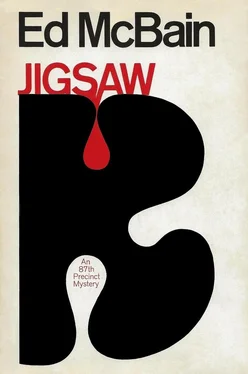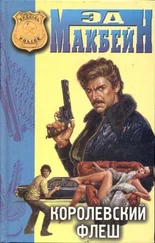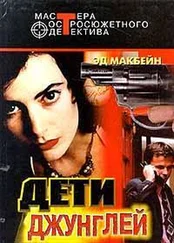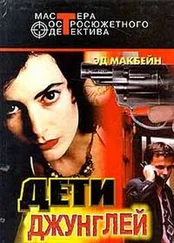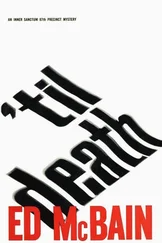“He told you that, huh?”
“That’s what he told me.”
“I’m surprised he didn’t sell you the Calm’s Point Bridge while he was at it.”
“This ain’t the Calm’s Point Bridge, Weinberg, and you know it.”
Weinberg was silent for a few moments. He kept looking down at his clasped hands. Then he raised his eyes to Brown’s and said, “You’ve a piece of the snapshot, huh?”
“That’s right.”
“And I’m one of them, huh?”
“That’s right.”
“What’re the two names?”
“Yours is one of them.”
“And the other one?”
“I’ll tell you that after we make a deal.”
“And what’re these names supposed to be?”
“They’re supposed to be the names of two people who’ve also got pieces of that picture.”
“And I’m one of them, huh?”
“That’s right.”
“You’re nuts,” Weinberg said.
“I told you most of this on the phone,” Brown said. “If you think I’m nuts, what’re you doing here?”
Weinberg studied him again. He unclasped his hands, took a cigarette from a package in his pocket, offered one to Brown, and then lighted both of them. He let out a stream of smoke, leaned back in his chair, and said, “Did your pal Danny Firth say how you could get seven hundred and fifty G’s by pasting a picture together?”
“He did.”
“How?”
“Weinberg... you know, and I know the full picture shows where Carmine Bonamico dropped the NSLA loot.”
“I don’t know what you’re talking about.”
“You know exactly what I’m talking about. Now how about it? You want to keep playing cute, or you want to talk a deal?”
“I want some more information.”
“Like what?”
“Like how’d your pal Danny Firth come across his piece?”
“He got it from a guy at Utah State. The guy was doing life, no chance of getting out unless he busted out, which he wasn’t about to do. Danny promised to look after his wife and kids if he recovered the loot.”
“So Danny gets out, and turns right around and sells you his piece, huh?”
“That’s right.”
“Nice guy, Danny.”
“What do you expect?” Brown said, and smiled. “Honor among thieves?”
“Which brings us to you,” Weinberg said, returning the smile. “What’s your bag?”
“I’m in and out of a lot of things.”
“Like what?”
“The last thing I was in and out of was San Quentin,” Brown said, and smiled again. “I did five years for hanging some paper. It was a bum rap.”
“It’s always a bum rap,” Weinberg said. “Let’s get back to the picture for a minute. How many pieces are there, do you know?”
“I was hoping you’d know.”
“I don’t.”
“We can talk a deal, anyway.”
“Maybe,” Weinberg said. “Who else knows about this?”
“Nobody.”
“You sure you didn’t tell your brother all about it? Or some broad?”
“I haven’t got a brother. And I never tell broads nothing.” Brown paused. “Why? Who’d you tell?”
“Not a soul. You think I’m crazy? There’s big money involved here.”
“Oh, all at once you know there’s big money involved, huh?”
“What’s the other name on your list?”
“Do we have a deal?”
“Only if it’s a name I don’t already have.”
“How many do you have?”
“Just one.”
“That makes us even.”
“Unless it’s the same name.”
“If it’s the same name, neither of us have lost anything. Here’s the deal, Weinberg, take it or leave it. I put up the name and the piece I’ve got, you put up the name and the piece you’ve got. If we find the loot, we split it fifty-fifty — after deducting expenses. I’ve already laid out two grand, you know.”
“That’s your headache,” Weinberg said. “I’m willing to share whatever expenses we have from now on, but don’t expect me to pay for a bar mitzvah when you were thirteen.”
“Okay, forget the two grand. Have we got a deal?”
“We’ve got a deal,” Weinberg said, and extended his hand across the table. Brown took it. “Let’s see your piece of the picture,” Weinberg said.
“Amateur night in Dixie,” Brown said, shaking his head. “You didn’t really think I’d have it with me, did you?”
“No harm trying,” Weinberg said, and grinned. “Meet me later tonight. We’ll put it all on the table then.”
“Where?”
“My place?” Weinberg asked.
“Where’s that?”
“220 South Kirby. Apartment 36.”
“What time?”
“Eleven o’clock okay with you?”
“I’ll be there,” Brown said.
220 South Kirby was in a slum as rank as a cesspool. Arthur Brown knew such slums well. The overflowing garbage cans in front of the building were quite familiar to him. The front stoop held no surprises; cracked cement steps, the middle riser of which was lettered in white paint with the words NO SITTING ON STOOP; rusted wrought-iron railings; a shattered pane of glass in the entrance door. The locks on the mailboxes in the foyer, where welfare checks were deposited each month, were broken. There was no light in the foyer and only a single naked bulb illuminated the first-floor landing. The hallway smelled of cooking, breathing, eliminating. The stench that assailed Brown as he climbed to the third floor brought back too many memories of a lanky boy lying in bed in his underwear, listening to the sounds of rats foraging in the kitchen. His sister, in the bed next to his, in the same bedroom shared by his mother and father, would whisper in the darkness, “Are they here again, Artie?” and he would nod wide-eyed and say reassuringly, “They’ll go away, Penny.”
One night, Penny said, “Suppose they don’t, Artie?”
He could find no answer. In his mind’s eye, he saw himself walking into the kitchen the next morning to discover the room swarming with long-tailed rats, their sharp fangs dripping blood.
Even now, he shuddered at the thought.
Suppose they don’t, Artie?
His sister had died at the age of seventeen, from an overdose of heroin administered in a cellar club by a teenage girl who, like Penny, was one of the debs in a street gang called The Warrior Princes. He could remember a time when one of the boys painted the name of the gang in four-foot high letters on the brick wall of a housing project — THE WARIOR PRINCES.
In the darkness of the third-floor landing, Brown rapped on the door to 36, and heard Weinberg say from within, “Yes, who is it?”
“Me,” he answered. “Stokes.”
“It’s open, come in,” Weinberg said.
He opened the door.
Something warned him a second too late. As he opened the door, he could see through into the kitchen, but Weinberg was nowhere in sight. And then the warning came, the knowledge that Weinberg’s voice had sounded very near to the closed door. He turned to his right, started to bring up his hand in protection against the coming blow — but too late. Something hard hit him on the side of his head, just below the temple. He fell sideways, almost blacked out, tried to get to his knees, stumbled, and looked up into the muzzle of a .38 Special.
“Hello there, Stokes,” Weinberg said, and grinned. “Keep your hands flat on the floor, don’t make a move or I’ll kill you. That’s it.”
He stepped gingerly around Brown, reached under his jacket from behind, and pulled his gun from the shoulder holster there.
“I hope you’ve got a license for this,” he said, grinned again, and tucked the gun into the waistband of his trousers. “Now get up.”
Читать дальше
